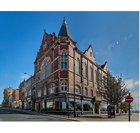CP Electronics helps to restore building to life

Energy-efficient lighting for the refurbished and revived Unity Hall in Wakefield is achieved by detectors from CP Electronics that respond to presence/absence and levels of ambient light. Unity Hall was a mainstay of Wakefield’s social, cultural life since it was built in 1904, but fell into disuse towards the end of the 20th century.
A combination of microwave and passive infrared absence/presence sensors can turn lights on when a room is occupied and off when it is empty. All the devices enable the user to customise settings to their own requirements and can be programmed to respond to levels of ambient light.
The revitalised building provides a combination of performance, conference and event space with associated hospitality areas, a cafe-bar that is open to the public and a range of flexible working/office space with all modern amenities.
The installation work was carried out by Preston Electrical, and Dave Preston explained, ‘This is a great example of how CP Electronics' expertise and our own skills combined perfectly to deliver the contract.
‘The commissioning support that CP Electronics gave us and its ability to provide a lighting control solution that contributed clearly and directly to reducing cost and improving the client's carbon footprint,meant that we were able to give the client exactly what they wanted, in a very cost-effective way.







